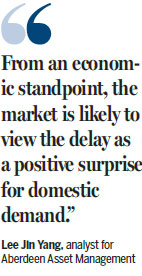PM to delay proposed sales tax increase
Japanese Prime Minister Shinzo Abe told lawmakers on Wednesday that he has decided to delay a scheduled sales tax hike by two-and-a-half years, putting his plans for fiscal reforms on the back burner amid more weakness in the economy.
The widely-anticipated delay will be welcomed by a majority of voters, who will cast ballots in an upper house election in July.
But it is fanning doubts about Abe's plans to curb Japan's huge public debt and fund ballooning social welfare costs of a fast-ageing population.
"I want to fulfill my responsibility by accelerating Abenomics more and more," Abe told a gathering of his ruling Liberal Democratic Party on Wednesday. "I have decided to delay the sales tax hike to 10 percent by two and half years."
It would be the second time that Abe has delayed the increase in the sales tax to 10 percent from 8 percent, after a rise from 5 percent in April 2014 tipped the economy back into recession.
Abe took office in December 2012 pledging to beat deflation and reboot the moribund economy with his "Abenomics" revival recipe, but has made little headway amid stubbornly weak domestic and export demand.
"From an economic standpoint, the market is likely to view the delay as a positive surprise for domestic demand," said Lee Jin Yang, macro research analyst for Aberdeen Asset Management in Singapore.
Abe, whose term as LDP president and hence, premier, ends in September 2018 unless the LDP changes its rules, had repeatedly said he would implement the tax rise as planned unless the economy faced a shock from a financial crisis or natural disaster.
But he laid the groundwork for a delay at last week's Group of Seven summit, insisting his G-7 partners shared a "strong sense of crisis" about the global economic outlook and drawing parallels to the 2008 world financial crisis that followed the bankruptcy of Lehman Brothers.
Many economists said Abe's comparisons to the Lehman Brothers failure were far-fetched, but there is consensus that Japan's economic data has been disappointingly weak.

(China Daily 06/02/2016 page12)














